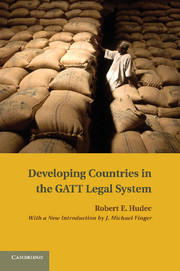Book contents
- Frontmatter
- Contents
- Foreword by Hugh Corbet
- Acknowledgments
- DEVELOPING COUNTRIES IN THE GATT LEGAL SYSTEM
- Introduction to the New Edition
- PART I A HISTORY OF THE LEGAL RELATIONSHIP
- 1 Post-war Negotiations on Trade Liberalization
- 2 First Decade of the GATT – 1948–1957
- 3 Demands for a New Legal Relationship – 1958–1963
- 4 Defining the New Relationship – 1964–1971
- 5 Testing the New Relationship – 1972–1979
- 6 Developments in the 1980s – Form without Substance
- PART II A LEGAL CRITIQUE OF THE GATT'S CURRENT POLICY
- List of References
- Index
4 - Defining the New Relationship – 1964–1971
Published online by Cambridge University Press: 03 May 2011
- Frontmatter
- Contents
- Foreword by Hugh Corbet
- Acknowledgments
- DEVELOPING COUNTRIES IN THE GATT LEGAL SYSTEM
- Introduction to the New Edition
- PART I A HISTORY OF THE LEGAL RELATIONSHIP
- 1 Post-war Negotiations on Trade Liberalization
- 2 First Decade of the GATT – 1948–1957
- 3 Demands for a New Legal Relationship – 1958–1963
- 4 Defining the New Relationship – 1964–1971
- 5 Testing the New Relationship – 1972–1979
- 6 Developments in the 1980s – Form without Substance
- PART II A LEGAL CRITIQUE OF THE GATT'S CURRENT POLICY
- List of References
- Index
Summary
THE SCHEDULING of the UNCTAD conference for the spring of 1964 precipitated an effort within the GATT to demonstrate more forcefully its commitment to the interests of developing countries. The first step was a decision to draft amendments to the legal text of the General Agreement that would consolidate the various strands of the GATT's emerging policy towards developing countries. Initially, it was contemplated that the new legal text would be placed in Article XVIII. The new text grew so long, however, that at the last moment it was re-packaged as a new Part IV of the General Agreement.
PART IV OF THE GATT
The importance of Part IV is not easy to describe. From a technical point of view, Part IV added nothing to the existing legal relationship between developed and developing countries. Part IV was only a slightly more impressive statement of the urgent but non-binding texts that the Action Program had been issuing over the preceding five years, giving them a permanent form in the text of the General Agreement. The language of Part IV was a bit more legalistic, giving the illusion of greater commitment. Indeed, the title of the new Article XXXVII, “Commitments”, actually said so. In fact, however, the text of Part IV contained no definable legal obligations.
- Type
- Chapter
- Information
- Developing Countries in the GATT Legal System , pp. 64 - 74Publisher: Cambridge University PressPrint publication year: 2010

